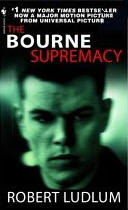 With his identity - if not his memory - recovered, the man once known as Jason Bourne has settled down (more or less) into New England academia. Needless to say, all that’s about to change, for there’s a new assassin operating in Asia - and he’s calling himself Jason Bourne. A few people in the intelligence services have come up with a cunning plan: use the original to catch the impostor. Feed him a carefully-selected pack of lies, snatch his wife and set up conditions for her return, make him snap back to his old ways. Then just sit back and wait for the assassin to be delivered. Simple.
With his identity - if not his memory - recovered, the man once known as Jason Bourne has settled down (more or less) into New England academia. Needless to say, all that’s about to change, for there’s a new assassin operating in Asia - and he’s calling himself Jason Bourne. A few people in the intelligence services have come up with a cunning plan: use the original to catch the impostor. Feed him a carefully-selected pack of lies, snatch his wife and set up conditions for her return, make him snap back to his old ways. Then just sit back and wait for the assassin to be delivered. Simple.
Or not. An underestimated Marie escapes in Hong Kong, jeopardising the plan, and Bourne starts devising some plans of his own - as does the impostor. MI6 has a traitor in the ranks, and if things don’t work out a large portion of the Far East could be plunged into chaos.
I must not have a mind geared toward politics and economics, because I’m a little vague on just how the disaster would ensue. Something to do with the future handover of Hong Kong, a crime lord in Beijing and an assassin being used to knock off anyone who might stand in the way ... and some economic considerations I can’t really recall. I also couldn’t work out whether ‘taipan’ was a term applied to gang bosses, or to any successful businessman, legal or otherwise. (And were they named after the snakes, or vice versa? Or were both named after some other source?) I eventually gave up pondering too much, figuring that it wasn’t really the sort of book you need to read with your brain engaged. Nevertheless, I still couldn’t help wondering just how Marie managed to fool the doctors so well, or marvelling at our hero’s almost multiple-personality switches of identity. Reading it does require a sizeable suspension of disbelief. In spite of this I enjoyed seeing Marie outwit the men and Alexander Conklin get a chance to redeem himself after his poor judgment rendered him one of the bad guys in the first book.
Rating: C+

















No comments:
Post a Comment